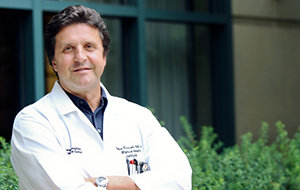A new $6 million, five-year grant from the National Institutes of Health extends funding for the Silvio O. Conte Cleveland Digestive Diseases Research Core Center (DDRCC), a cross-institutional collaboration of digestive disease investigators.
In 2015, an initial $6 million, five-year NIH grant established the DDRCC as one of only 17 in the country. (There are now 18.)
The Cleveland collaborative, which includes the Case Western Reserve University School of Medicine, Cleveland Clinic, University Hospitals Cleveland Medical Center (UH) and the Louis Stokes Cleveland VA Medical Center (LSCVAMC), works to develop and advance research on digestive inflammation, gastrointestinal cancer and liver and metabolic diseases.

“The overall objective of the Cleveland DDRCC,” said Fabio Cominelli, professor of medicine and pathology and associate dean for program development at the School of Medicine and the center’s director, “is to increase the availability of resources for center members and foster research, collaborations and new directions in digestive disease research, leading to important scientific discoveries.”
Cominelli, the Herman Menges, MD Professor in Internal Medicine at the School of Medicine and chief scientific officer of the Digestive Health Institute at UH, is an internationally recognized expert in such conditions as inflammatory bowel disease, Crohn’s disease, gastrointestinal cancer and ulcerative colitis.
The Cleveland DDRCC’s mission is to:
- Enhance the research capabilities of its investigators;
- Develop and implement programs to support young investigators;
- Attract established investigators not currently involved in digestive disease research;
- Facilitate the translation of basic research discoveries to the clinical arena.
The center currently includes 47 full members and 35 associate members from 25 academic departments across Case Western Reserve, Cleveland Clinic, UH and LSCVAMC, representing a steady expansion during the previous funding cycle.
Together, these investigators comprise the center’s research base, which consists of $17.3 million in peer-reviewed federal and foundation grants for two specific focus research areas—digestive inflammation and tumorigenesis, and liver disease and metabolism.

